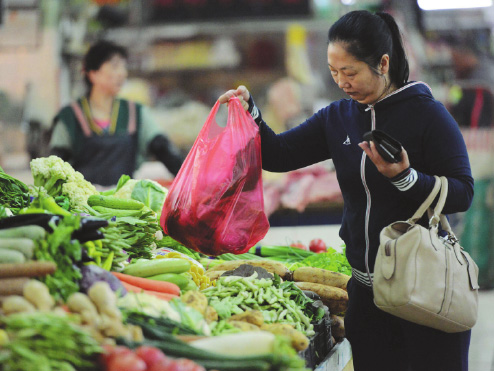Plastic ban taps green business
(Xinhua) Updated: 2015-06-19 09:37
 |
|
Single-use plastic bags were predominant in China's vegetable markets. [Photo/China Daily] |
When Wang Bin heard about Jilin province's plan to ban non-biodegradable plastic bags, it inspired a career switch.
The Heilongjiang businessman left the construction industry and started a company that produces eco-friendly plastic bags in the province last August.
"In the beginning, I was not confident about my business prospects and was worried about whether the ban would be effectively enforced," he said. "But those turned out to be unnecessary worries, as demand for my products is on the rise."
Jilin approved the country's first ban on the production and sale of single-use, nonbiodegradable plastic shopping bags. The ban went into effect on Jan 1.
The regulation was widely considered an upgraded version of a nation al ban that has been in place since June 2008. China bans supermarkets and retailers from offering free plastic bags. Production and use of plastic bags thinner than 0.025 mm are also prohibited.
Song Gang, vice-director of the Jilin Province Development and Reform Commission, said use of plastic bags in the province decreased by almost half during the first six months of the national ban, but later rose.
"The ban had a limited deterrent effect on consumers, but it helped increase retailers' profits. Some supermarkets can earn more than 10 million yuan ($1.6 million) per year by selling plastic bags," he said. "Therefore, we decided to curb 'white pollution' at the source by turning to biodegradable plastic bags."
Six months have passed since Jilin launched the ban. Since then, about 50 percent of petroleum-based plastic bags have been replaced with biodegradable ones made from polylactic acid, a biopolymer derived from plant starch. More than 85 percent of plastic bags used by chain supermarkets with annual sales over 200 million yuan are environmentally friendly, according to the commerce department of Jilin.
"The price of green plastic bags is generally 0.1 yuan higher than traditional ones, and most customers don't mind the price rise," said a cashier at Zhuozhan Supermarket in the provincial capital of Changchun. The supermarket sells around 200 plastic bags every day.
"We should applaud the government's decision to use more environmentally friendly plastic bags. I believe it is even better for us to bring our own grocery bags when shopping," Changchun resident An Qi said.
The ban has also brought about green business opportunities for people like Wang Bin. Wang's company can produce 1,800 metric tons of polylactic acid plastic annually, which amounts to more than 500,000 green plastic bags daily.
- China 'incredibly innovative' in many areas: Apple CEO
- City official: Guangzhou further committed to opening-up
- Jack Ma: Globalization backed by technology will cut inequality
- HNA confirms interest in ASEAN's infrastructure investment
- Comments on Xi's letter to 2017 Fortune Global Forum
- China to create more opportunities for the world: Xi
- US tax cuts impact on China two-sided: economists
- Chinese enterprises job fair to be held in Sri Lanka

















